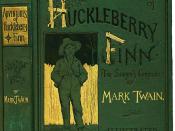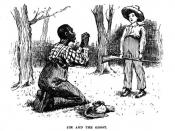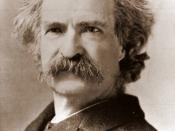"At the heart of Huckleberry Finn lies a story about real human figures with genuine moral and ethical problems and decisions..." (Lauriat 26). This statement reveals the true nature of Twain's controversial novel by looking at the deeper messages of the book. This novel is a hot debate topic in any English classroom because many find it hard to look past the few racist epithets that are repeated and analyze the issues that the author, Mark Twain, addresses. Supporters of the novel state that because Twain was a "product of his time," his book reveals the harsh stereotypes of that period, something that must be looked at more closely. Opponents claim that the continuous racial insults void the book of any true substance.
Controversy cannot be avoided with the novel, The Adventures of Huckleberry Finn, but analyzing this controversy is what is important to high school students. Despite being occasionally depicted in negative ways, the numerous positive portrayals of African Americans make this novel quite appropriate for high schools because it obligates high school students to analyze and understand how blacks overcame the stereotypes against them in the Southern society.
Twain constantly criticizes the white society by proving just how strong and competent blacks were during the racist period, and students must be able to analyze these criticisms. Throughout the novel, Jim is constantly shown as a positive figure, characterized by paternal qualities, selfless deeds, and his assertion of his intelligence, while the racist white characters are depicted as narrow-minded when they criticize Jim.
First, however, critics of this book feel it is inappropriate for classroom because of some of the racial epithets. One such example is the repeated use of the word "nigger" to describe a black person. As an African American school teacher states, "It...


